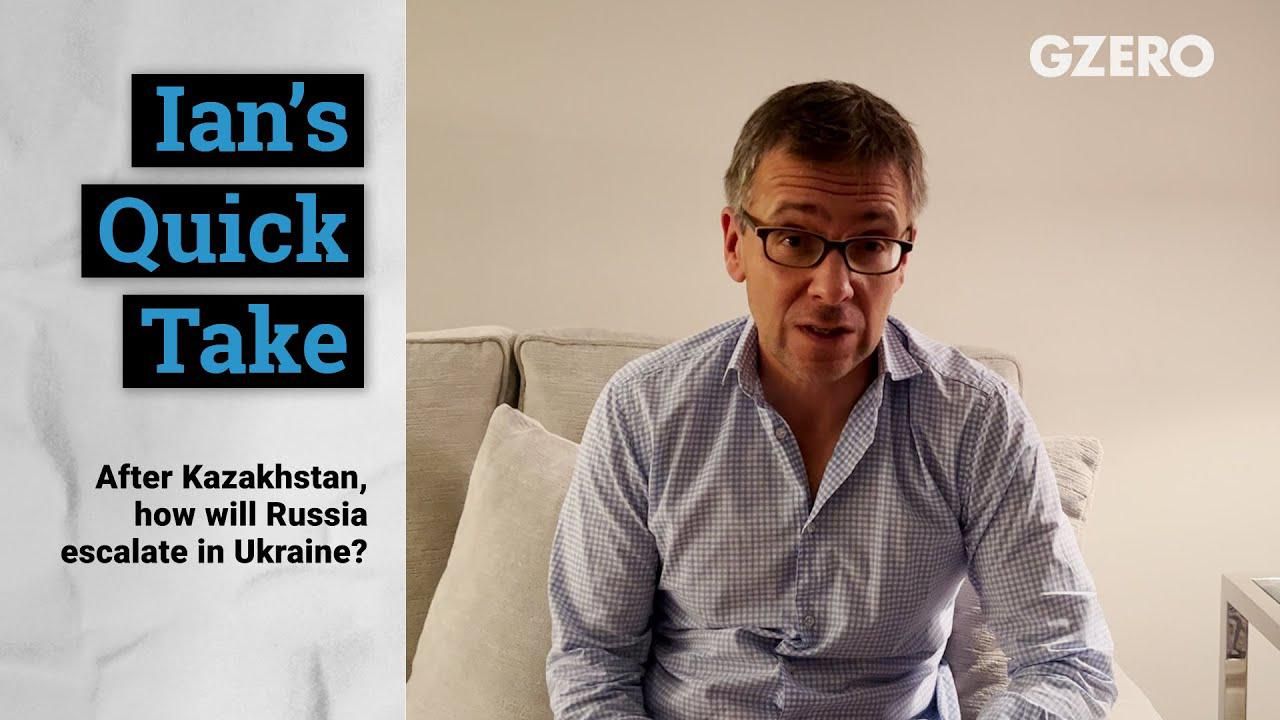Quick Take
After Kazakhstan, how will Russia escalate in Ukraine?

After Kazakhstan, How Will Russia Escalate In Ukraine? | Quick Take | GZERO Media

Ian Bremmer's Quick Take: Hey everybody, Ian Bremmer here and kicking off the week with some excitement in Kazakhstan and the beginning of the most important bilateral negotiations the US is going to have in some time with the Russians.
First I'll start off on Kazakhstan. It was a surprise to everyone, certainly the Kremlin to find out that suddenly what had started as worker demonstrations that got violent very fast, because fuel prices went up significantly with the Kazakh government, suddenly became nationwide and very violent. And the special forces, the interior forces were basically standing aside. Looks like this... Yes, there's a lot of anger with corruption. There's a lot of anger with a state that's unresponsive to the economic needs of its people. But there was also major elite infighting and Nazarbayev, the former president, the still leader of the Kazakh people, got the short end of the stick. Tried to make a move against Tokayev, failed. His head of intelligence has been removed and arrested. Dozens of Nazarbayev connected oligarchs have fled the country.
And what's most interesting is the Russian government having had no idea that any of this was likely to happen. Was requested by President Tokayev to send troops and they did within 24 hours. And 3,000 Russian peacekeepers, paratroopers and others, and once they showed up to provide support and secure key facilities, suddenly the members of this security forces knew that Tokayev was going to win. It became very violent, very brutal. It looks like some 200 people have died. Thousands have been arrested, but this is the end of the story. So Nazarbayev is basically out, Tokayev is in charge. The Russians have more influence than before though, Kazakhstan's always leaned in that direction. And a message has been sent very strongly to Belarus and to the West. That the Russians are prepared to do whatever is necessary to ensure that they exert dominion over countries and governments that they think are within their sphere of influence.
That of course leads to the big question, which is, well, what about Ukraine? Because of course, Ukraine has an independently elected government that is very aligned to the West. They want to join NATO. They'd like to join the European Union. Neither of those two things are really on offer, but the population is massively anti-Russian, only more so because of the 2014 annexation of Crimea and invasion into Southeast Ukraine. The negotiations have gone nowhere yet. I would say it is on balance slightly better than not, because the Russians and the Americans both agree they'd like more talks in the near future. More talking means that the Russians aren't about to escalate in the immediate future. But the Russians continue to say that this is urgent, decisions have to be made quickly and that nothing has been provided so far from the Americans that would lead the Russians to believe that they don't need to escalate.
The big question is what is that escalation? In the West, there's been a lot of concern that the Russians are going to invade and take further Ukrainian territory. If they do that, of course, then you'll have a collective stronger response from the US and EU, from the US and its NATO allies, which doesn't help the Russians at all. So I think the real issue here is are the Russians prepared to escalate in ways that are short of invasion, but have the potential to drive apart the Americans and the Europeans. And as the Russians say that that is something they are credibly able to do, do the Americans in response allies or without even prepared to provide any level of concession to the Russians that would allow them both face saving and the ability to back down, the willingness to back down? And that right now is a very open question.
So still very big uncertainty and indeed instability over what the Russians are likely to do in Ukraine vis-a-vis the Americans and the Europeans. And hard for the Americans to respond effectively. But at least they're still talking. The US Russia talks that we just had are by far the most important, the NATO talks aren't going to go very well, but that's not where the action is really happening. At least not from Moscow's perspective. And they're the ones that are doing the escalating. What will be most interesting, we see when is the next Putin-Biden conversation. I expect that's going to be announced in short order and more bilaterals at a high level between Moscow and Washington.
That's it for me. Hope everyone is real good. Talk to you soon.